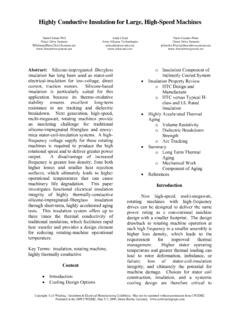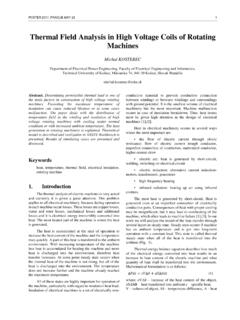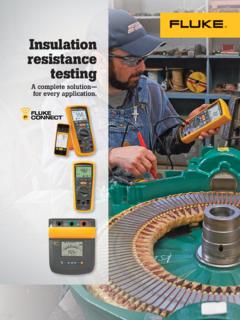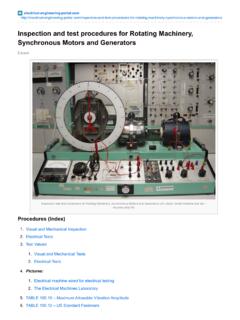Transcription of Silicone Based Electrical Insulation Material for High ...
1 Silicone TECHNOLOGIES DIVISION 1100 Governor Lea Road, Bear, DE 19701 (302) 834-2100 _____ Copyright: Coil Winding / Insulation & Electrical Manufacturing Exhibition. May not be reprinted without permission from CWIEME. Presented at the 2011 CWIEME, May 24-26, 2011, Messe Berlin, Germany. Silicone Based Electrical Insulation Material for high speed / voltage rotating Machines Haibing Zhang, Andy Cloud Arlon Silicone Technologies 1100 Governor Lea Road Bear, DE 19701 United States Website: Email: Phone: 1-302-834-2100 Abstract This paper introduces the key requirements for resin rich Electrical Insulation materials for rotating machinery. The key requirements, or stresses that Insulation are subject to, are summarized as (thermal, Electrical , ambient, and mechanical). Resin rich Insulation materials can be Based on Silicone , epoxy, polyester, polyesterimide, and other polymers.
2 Among all of these Insulation materials, Silicone Based Insulation best fits into many rotating machinery applications because of stability across a wide temperature range and the ability for highly thermally conductive designs. However, many medium and high voltage rotating machinery applications do not utilize resin rich Silicone Based Insulation because of concerns about dielectric integrity and voltage endurance, especially with highly thermally conductive designs. Arlon has recently developed improvements in highly thermally conductive Insulation designs with greater dielectric integrity and voltage endurance. These improvements coupled with temperature stability and elasticity provide an excellent design platform for Electrical Insulation to be utilized in a next generation of rotating machinery.
3 Content 1. Introduction 2. Overview of Insulation Materials for rotating Machines Mica Polyester Epoxy Polyimide Silicone 3. Key Requirement for Insulation Materials in high speed / voltage rotating Machinery 4. Arlon NG Silicone Based Insulation Materials Dielectric Breakdown Strength voltage Endurance Thermal Conductivity Thermal Stability 5. Conclusion 6. References Silicone TECHNOLOGIES DIVISION 1100 Governor Lea Road, Bear, DE 19701 (302) 834-2100 _____ Copyright: Coil Winding / Insulation & Electrical Manufacturing Exhibition. May not be reprinted without permission from CWIEME. Presented at the 2011 CWIEME, May 24-26, 2011, Messe Berlin, Germany. 1. Introduction Electrical Insulation materials are pervasive in our life and work. Every piece of Electrical equipment contains an Insulation Material .
4 In the past century, the large-scale use of polymeric materials for Electrical Insulation purposes has resulted from the excellent Electrical properties and process ability of polymeric Material [1-2]. Electrical rotating machinery rated at >1 KW is classified into two categories: 1) motor, which converts Electrical energy into mechanical energy, 2) generator or alternator, which converts mechanical energy into Electrical energy. Motors and generators can be either alternating current (AC) or direct current (DC). Most motors and generators consist of a stator winding and a rotor winding which require Electrical Insulation materials [3]. The basic stator Insulation system components are shown in Figure 1. These Insulation components together ensure that an Electrical short does not occur, that the heat from the conductor losses are transmitted to a heat sink, and that the conductor does not vibrate in spite of the magnetic force [3].
5 Strand Insulation to reduce skin effect of copper strands Turn Insulation to prevent Electrical short between turns. In some applications, there is no strand Insulation . In those applications, turn Insulation can be also called conductor Insulation . Groundwall Insulation to prevent ground fault from high potential. Figure 1 The cross section of a typical insulated stator coil The Insulation materials of a rotor winding include turn Insulation and ground wall Insulation . Turn Insulation and groundwall Insulation in a rotor can be relatively thin since the voltage in a rotor is typically lower than that in a stator. However, the rotor winding Insulation must have very high Copper strand Strand Insulation Turn Insulation Groundwall Insulation Silicone TECHNOLOGIES DIVISION 1100 Governor Lea Road, Bear, DE 19701 (302) 834-2100 _____ Copyright: Coil Winding / Insulation & Electrical Manufacturing Exhibition.
6 May not be reprinted without permission from CWIEME. Presented at the 2011 CWIEME, May 24-26, 2011, Messe Berlin, Germany. compression strength, good abrasion strength and be supported to prevent distortion due to high rotational force in the rotor [3]. 2. Overview of Insulation Materials for rotating Machinery The selection of Electrical Insulation systems for rotating machines depends on the materials available, cost, and the technical requirements in machine design. Since the industry began a century ago, Insulation materials have been evolving from natural materials to mainly synthesized polymeric materials. The following insulations currently dominate the industry. Mica The outstanding dielectric and thermal endurance, inertness, and nonflammable characteristics of mica separate it from all other insulating materials [6].
7 For more than a century mica as a natural inorganic Material has proven to be a reliable and persistent insulating Material for groundwall Insulation , although its application requires some elaborateness [4]. Mica is unique amongst materials in having a high resistance to partial discharge therefore increasing the voltage endurance and prolonging the life of Insulation materials. It is generally believed that the mechanism responsible for this protective behavior is Electrical in nature and not physical. The high energy electrons resulting from partial discharge are slowed down and de-energized by the strong positive fields generated by the array of K+ ions held within the silicate lattice galleries. It is this effect which is apparently primarily responsible for the protective nature of mica in high voltage Insulation system [5].
8 Since mica as an inorganic flake Material lacks integration and flexibility, mica has to be combined with other Insulation materials like polyester, epoxy and Silicone as a resin rich tape or via vacuum pressure impregnation. Polyester Polyester can be used as a coating for strand/conductor Insulation and a resin rich mica tape for groundwall Insulation . Polyester has limited application in the VPI process. Polyester has a relatively low thermal class (less than class F). However, polyester is a good low cost option as an insulating polymer. Epoxy Epoxy resin is mainly used in high voltage Insulation systems as binder resin for resin rich mica tapes in groundwall Insulation or as an impregnating resin in the VPI process. Its main function includes: [4] Laminates the mica tape Fills the voids in mica flakes Provides good adhesion to the conductors Provides mechanical strength Protects against chemicals, dirt and humidity Silicone TECHNOLOGIES DIVISION 1100 Governor Lea Road, Bear, DE 19701 (302) 834-2100 _____ Copyright: Coil Winding / Insulation & Electrical Manufacturing Exhibition.
9 May not be reprinted without permission from CWIEME. Presented at the 2011 CWIEME, May 24-26, 2011, Messe Berlin, Germany. With a decent thermal class of F to H, solventless epoxy resin with low viscosity, <300cps, is dominating the VPI process. Polyimide Polyimide or polyesterimide can be used as a coating for strand/conductor Insulation and as the polymer resin in the resin rich mica tape for groundwall Insulation . Polyimide has a higher thermal class than epoxy resin. With the trend toward higher voltage motors with higher thermal classes (class F H or higher), low viscosity polyesterimide resin has become more and more popular in the VPI process as an epoxy resin replacement. Silicone Silicone rubber can be used as turn Insulation and groundwall Insulation . Silicone resin can be used as a coating for strand/conductor Insulation and impregnating resin in the VPI process.
10 Silicone rubber and Silicone resin have the best-in-class thermal rating (>class H). Silicone rubber is the only available Insulation Material which is elastic and flexible. The elastomeric property is very important for thermal mechanical decoupling and anti-vibration. 3. Key Requirements for Insulation Materials in high speed / voltage rotating Machines high speed , high voltage rotating machines operate in harsh industrial environments. These machines have higher requirements for Electrical Insulation materials than the conventional rotating machines. These requirements may include: Enhanced Electrical properties. Since the operation voltage is higher, the Electrical Insulation materials must be able to handle higher voltage as well. The improvement in dielectric breakdown strength, voltage endurance, and partial discharge resistance will result in a thinner Insulation Material .











